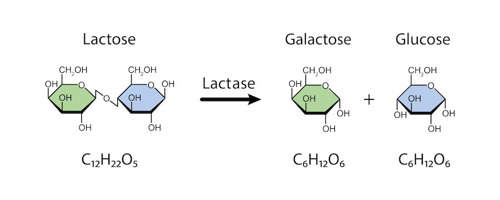
My parents are lactose intolerant. Does that mean when I grow up I will be too?
January 24, 2008

- Related Topics:
- Autosomal recessive inheritance,
- Lactose intolerance
A middle school student from California asks:
“My parents are both lactose intolerant. Does that mean when I grow up I will be lactose intolerant?”
If both of your parents are lactose intolerant, chances are you will be too. Because it is a recessive trait.
To understand what this means, we need to remember two things. First, we have two copies of most of our genes – one from mom and one from dad. And second, genes can come in different versions.
The gene involved in lactose intolerance is called lactase. The lactase gene has the instructions for making lactase enzyme. This enzyme breaks up lactose into simple sugars that your body can use.

Lactose is the major sugar found in milk. Without lactase, your body can't break down lactose. This causes the unpleasant feelings of being bloated and having gas and cramps and diarrhea.
The lactase gene actually comes in two different versions. One version keeps making lactase into adulthood. And another stops as a person gets older.
Lactose intolerant people have two copies of the gene that stops making lactase. People who can drink milk as an adult have either one or two copies of the version that stays on.1
This is why lactose intolerance is recessive. Because it only shows up when you have two copies of the same version.
What this all means is that your parents most likely have two copies each of the version that shuts off. Since you can only get this version from them, you will almost certainly be lactose intolerant too.
Lactose intolerance is different for different people
About half of Asians and Native Americans become lactose intolerant around two years old. By the time they are 6 years old, 80% of Asians and Native Americans are lactose intolerant and that number rises to over 90% by the time they are 10 years old. About 80% of African Americans and Hispanics are lactose intolerant as adults.2
But, there is a lot of variation in people with European ancestors. Only about 10% of people from Scandinavia and 25% of white Americans are lactose intolerant. In some parts of southern Europe as many as 80% of adults are lactose intolerant. Overall, many people with European ancestors can drink milk.1
What this means for you is that the age when you become lactose intolerant will depend on your exact genetic makeup. You can also get some idea about when based on the age your parents lost their ability to drink milk.
Most people can't drink milk
Up until now, we have been treating lactose intolerance like it is unusual. But it isn't! In fact, lactose intolerance is actually the "normal" trait. Around 70% of the world's adults are lactose intolerant.
What this means is we should be talking about why some people can drink milk as an adult. Because this is definitely not what happens in most mammals.
All mammals have the lactase gene. This gene is turned on just before a baby is born. That way, an infant can drink his or her mother's milk. In most mammals, the lactase gene shuts off when the baby is old enough to stop drinking mom's milk.
In people, by the time kids are two years old, most have stopped drinking mom's milk, too. This is also around the time that the lactase gene begins to shut off for lactose intolerant people.

But, some people can…
So why can people with European ancestors drink milk? Well, it turns out there is a single DNA change near the lactase gene. This DNA change happened a long time ago, probably in someone from Europe who then passed it on to his or her kids. This change keeps the lactase gene on so people with this change can drink milk as adults.
Also, a long time ago, Europeans domesticated cattle and some people started to drink their milk. The ones who could drink milk as an adult did better than their neighbors who couldn't. This meant that these folks probably had more kids and so passed down this DNA change (along with all of their other genes) down more often.
As Europeans spread out over the globe, they carried this DNA change with them. Now all those people with European ancestors have the DNA change and so can drink milk as an adult.

I have made this sound like only people with European ancestors can drink milk. But it isn't. Other groups domesticated cattle too. For example, some groups in East Africa and the Middle East also have a DNA change that keeps the lactase gene on in adults! This DNA change is a little different but is in nearly the same spot and so probably works the same way as in Europeans.3
Is it On or Off?
As I said before, the lactase gene works the same in everyone when they are infants. But normally there is a switch that turns the gene off when a child is old enough to stop drinking mom's milk.
Scientists think that there is a protein called a repressor that sits on the lactase DNA later in life. The repressor hides the gene from the cell so no lactase gene gets made.
The DNA mutations probably make it so the repressor can't sit on the lactase gene. This leads to the gene staying on.1
But why does it happen at different ages? Scientists are not sure if the gene turns off when a child is old enough to stop drinking mom's milk. Or, if it turns off after a child stops drinking mom's milk.
If the first case were true, maybe the repressor gets a signal to turn the gene off as a way to prevent the babies from taking too much nutrients and energy from the mom. So, the baby might get gas and diarrhea and other uncomfortable feelings. And, that's enough to urge them stop drinking mom's milk.
But, if the second case were true, maybe drinking milk every day would tell your body keep making lactase. When you stop drinking milk, the gene no longer gets the signal to stay on and use energy to make lactase, so the repressor comes and shuts it off. Then, when you try to drink milk again later, your body can't handle it anymore. And you feel the unpleasant feelings associated with lactose intolerance.
So, you can see, there are lots of unanswered questions about how the lactase gene works and why some people can drink milk, but others can't.

Author: Nanibaa' Garrison
When this answer was published in 2008, Nanibaa' was a Ph.D. candidate in the Department of Genetics, studying the genetics of human pigmentation in Greg Barsh's laboratory. Nanibaa' wrote this answer while participating in the Stanford at The Tech program.
 Skip Navigation
Skip Navigation
